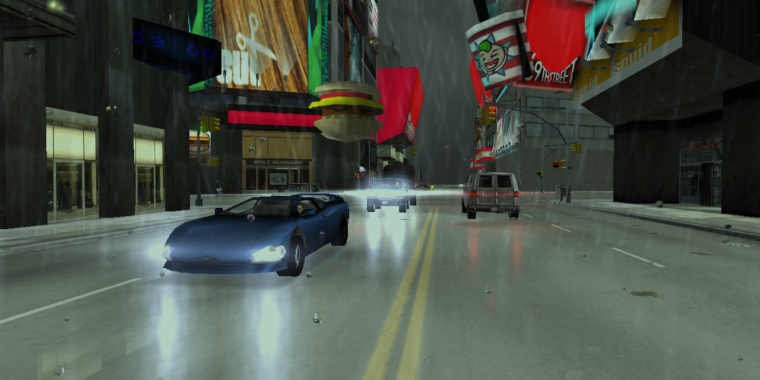Github reverses takedown of reverse-engineered GTA source code

-
Shots from the reverse-engineered version of Grand Theft Auto III showing off the graphical improvements over the 2002 original.
-
The recompiled versions haven’t done anything about the ever-present fog shrouding far-off objects, unfortunately.RockStar Games
-
Shiny roads.RockStar Games
-
Cool guys walking away from sunrises.RockStar Games
The reverse-engineered source code for the PC versions of Grand Theft Auto III and Vice City is back online today, months after it was originally posted and then quickly taken down due to a DMCA request from publisher Take-Two.
TorrentFreak reports on the restored version of the project, which was posted as a seemingly identical fork of the original by a New Zealand-based developer named Theo. While the original GitHub poster (who goes by the handle aac) has not contested Take-Two’s original takedown, Theo told TorrentFreak he filed a counterclaim to restore his copy of the project, saying it “contained no code owned by Take Two.”
A question of law
We’ve previously looked in depth at how video game fan coders use reverse-engineering techniques to deconstruct the packaged executable files distributed by a game’s original developers. This painstaking, function-by-function process creates raw programming code that can generate exactly the same binary file when compiled (though the code as distributed on GitHub still requires external, copyrighted art and sound assets from legitimate copies of the games).
In general, reverse-engineering source code from a compiled binary is less straightforwardly illegal than simply cracking a game’s DRM for piracy purposes, for instance. As the Electronic Frontier Foundation explains, US case law includes certain fair use exceptions that can allow for this kind of decompilation work for research or interoperability purposes.
In the case of Grand Theft Auto, though, the game’s End User License Agreement specifically asks players to agree not to “reverse engineer, decompile, disassemble, prepare derivative works based on or otherwise modify the Software, in whole or in part.” Back in 2005, the 8th Circuit Court of Appeals upheld a similar anti-reverse-engineering EULA to take down BnetD, a reverse-engineered version of Blizzard’s Battle.net that allowed the service to be emulated on private servers.
Whatever the legal status of the code, Theo told TorrentFreak that he “believe[s] Take-Two’s claim to be wholly incorrect… since the code may be functionally identical, but not exactly identical, they hold no claim to the code.” So Theo filed a DMCA counterclaim requesting the affected code be reposted within ten to 14 days. When that time passed without notice of a formal legal filing by Take-Two, GitHub followed the DMCA guidelines and reposted the code nine days ago without ruling definitively on the merits of either claim.
Take-Two hasn’t responded to a request for comment from Ars Technica, so we don’t know if the publisher will go through the legal motions to remove the code again. For now, though, fans with the technical know-how can enjoy improvements made on top of the reverse-engineered code, such as bug fixes, reduced load times, improved rendering, widescreen monitor support, and a free-floating camera system, to name a few examples (not to mention derivative ports of the game to new platforms like Linux, Switch, and the PlayStation Vita).
Listing image by RockStar Games
https://arstechnica.com/?p=1764252